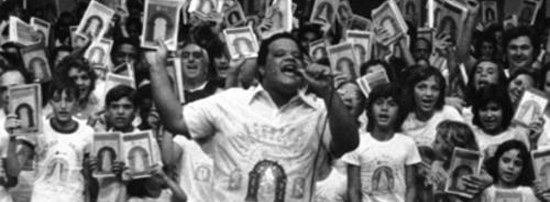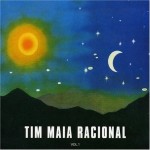
Tim Maia’s Journey into Rational Culture
07 July, 2010Out of all the Brazilian artists who came to the fore in the late 60s/early 70s Tim Maia was the one that embodied the rock ‘n’ roll spirit the most. His favourite cocktail was cocaine, cannabis and whiskey, he had a propensity for falling out with musicians, would often miss important appointments and gigs and even served a six-month stint in prison when a scholarship in the US ended in him being caught in possession of marijuana.
It’s this history that makes two of Maia’s recordings: Racional and Racional Vol. 2 so intriguing. By 1974 Maia had released four self-titled albums that included many of his classic tracks; “Cristina”, “A Festa do Santo Reis”, “Idade” and “These Are The Songs”, to name a few. His mix of American soul and funk with sprinkles of forró, samba and baião had been a big hit with Brazil’s youth.
He was close to putting the finishing touches on his fifth album in July 1974 when he decided to visit his friend Tibério Gaspar. During one occasion when he was waiting for Tibério to finish in the toilet he picked a book up from the table. Intrigued by what he read he took the book home with him. A couple of days later he rang his guitarist Paulinho. He wanted an emergency band meeting to discuss this book that had taken over his thoughts. The book was called Universo em Desencanto.
Universo em Desencanto or “Universe in Disenchantment” was written by Manoel Jacinto Coelho. It contains all the teachings of a sect known as ‘Rational Culture’. The sect teaches that there are no miracles, everything is natural. In order for the world to exist there needs to be a natural balance, and for a human being to achieve that natural balance they would need to read “Universe in Disenchantment“. It had entranced Maia so much that he had been to visit Coelho, as he mentioned in a 1991 interview with Playboy: “When I arrived there I saw the business was umbanda, candomblé (both Afro-Brazilian religions), basic spiritualism. He [Coelho] had lived there for 15 years in an enormous property that even included a motel for extraterrestrials.” That was one of the other things about Rational Culture. They believed that aliens exist.
If this all sounds a bit too much it is surprising how his band at the time seemed to receive Maia’s change of direction. The music and some of the vocals had been completed for his upcoming release. Maia wanted to change all the lyrics to reflect his new faith. So it was that songs such as “Adios San Juan de Puerto Rico” became “Quer Queira Não Queira.” The band, consisting of Paulinho (guitar), Serginho (trombone), Robson Jorge (guitar & keys) and Oberdan Magalhães (sax & flute), have few memories of this era but surprisingly went along with many of Maia’s suggestions, Serginho remembering “It was a very painful time. Tim lived watching the sky for flying saucers. The worst thing of all was that he convinced us [the band] to join the sect. We painted all our instruments white, even the drums. He threw away all the material products from his apartment. He threw outside his cooker, fridge freezer and even the carpet.”
 Racional was released in 1975. It’s an álbum with some strong moments. Lead single “Imunizacao Racional (Que Beleza)” was a smooth soul track in the vein of The Isley Brothers, a band who seemed to have a big influence too on “Bom Senso” with its incendiary guitarwork. Listening to the album it’s impossible to ignore the influence of ‘Rational Culture.’ For a start look at the song titles: “Energia Racional”, “Contato Com O Mundo Racional” and “Universo em Desencanto” to name a few, but perhaps more perplexing is Maia’s choice to insert 30 second interludes telling people to buy ‘Universo em Desencanto’ or even to fold this message into one of the songs. The classic example here is ‘Racional Culture’, a stripped-down funk tune with the declaration:
Racional was released in 1975. It’s an álbum with some strong moments. Lead single “Imunizacao Racional (Que Beleza)” was a smooth soul track in the vein of The Isley Brothers, a band who seemed to have a big influence too on “Bom Senso” with its incendiary guitarwork. Listening to the album it’s impossible to ignore the influence of ‘Rational Culture.’ For a start look at the song titles: “Energia Racional”, “Contato Com O Mundo Racional” and “Universo em Desencanto” to name a few, but perhaps more perplexing is Maia’s choice to insert 30 second interludes telling people to buy ‘Universo em Desencanto’ or even to fold this message into one of the songs. The classic example here is ‘Racional Culture’, a stripped-down funk tune with the declaration:
“We’re gonna rule the world don’t you know, don’t you know,
We’re gonna put it together”
A lyric which would seem far less ominous without knowing the story of the album. When the song breaks down after six minutes Maia lays down the message even clearer:
“Listen you all we’re gonna tell you the most important thing that you ever heard in your life, you never heard that before. We came from a super world, world of rational energy and we live in the empty world, world of animal’s energy. Read the book, the only book, the book of good, universe in desnchantment and you’re going to know the truth.”
It should be noted that all of this song is in English, as well as some of the other parts of this album (and plenty of songs in Maia’s catalogue). The album was self-released by Maia, using a label he called Seroma (taken from his full name Sebastião Rodrigues Maia). The album sold few copies (with all profits going to the cult), not helped by the fact that it was being released by this small, new label and not Philips with its huge distribution network. Shows were almost exclusively filled by members of the cult, normally arriving by caravan. He released a second volume of Racional in 1976. It was a more solid record with less divergencies into trying to sell the book, and included “O Caminho do Bem”, a song now immortalized via its use in City of God.
Eventually Maia became disillusioned with Coelho and caused a real scandal. Followed by Paulinhos he shouted from the window, to all passers-by that ‘Universo was a lie’. He returned to his previous lifestyle and artistic instincts, even putting on some of the weight that he’d lost from abstaining from drink and drugs during the time. He would often speak negatively about the experience in later years, famously responding to Marisa Monte informing him that she would be recording one of his songs from the period by saying “Why do you want to listen to this Marisa Monte? Leave it alone, Marisa Monte!”
In reality, apart from the obvious embarrassment of believing something that you then later decide is a lie, there is very little need for Maia to hide from these discs. They have even become collector’s items with copies trading hands for as much as R$250. In 1995 they were re-released by Trama Records, meaning that many people got to hear this music for the first time, and interest continues to grow in them. There are even bands in Brazil who exclusively play music from this period in Maia’s career.
Follow Sounds and Colours: Facebook / Twitter / Instagram / Mixcloud / Soundcloud / Bandcamp
Subscribe to the Sounds and Colours Newsletter for regular updates, news and competitions bringing the best of Latin American culture direct to your Inbox.

